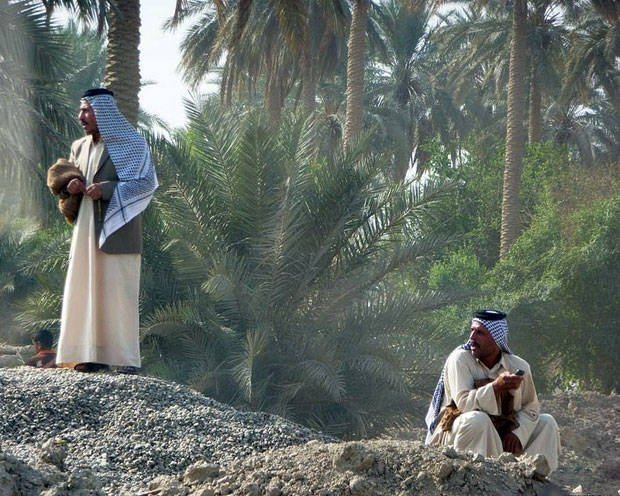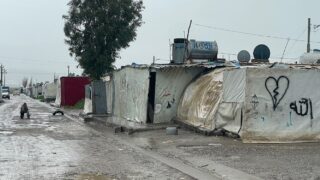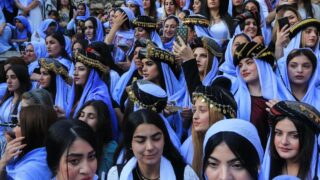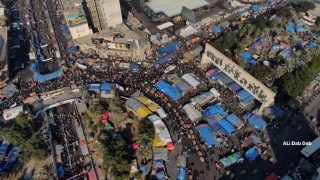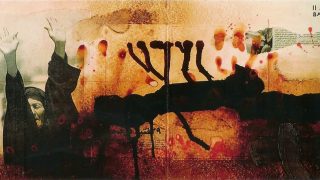When a fire broke out on the Tigris river, people at first thought they were being visited by a miracle. One of those new miracles that are on the increase around Iraq. But soon enough the real explanation for what was going on came to the surface. To start with, an armed group had blown up three oil pipelines in Salahaddin province, to the north of Baghdad, causing a fuel spill to flow onto the surface of the river. Then a farmer, thinking he could save both his own harvest and the river, took matters into his own hands and lit the spill on fire, spreading the flames down the river and into other provinces, and adding yet another new crisis to the numerous crises already besetting the country.
As last year drew to a close, the country's sprawling and pervasive crises arrived at a new phase. The phase of water wars. First, the Kurdistan regional government, threatening to cut off the water for the country's downstream provinces, unless the federal government agrees to pay Kurdistan's regional share of the country's annual budget.
Then there is the Islamic State of Iraq and the Levant [DAESH in Arabic], which controls Fallujah and other portions of Anbar province in Western Iraq. With the Fallujah dam, DAESH can prevent the water of the Euphrates river from flowing to the provinces of the center and south of the country.
Meanwhile the oil slick sails down the river like some boat of destruction, depriving Diyala and Baghdad of water, and leaving the government with not a clue on how to solve the problem.
Natural resources have been transformed into indispensable weapons in the sectarian and regional warfare that is consuming Iraq. In particular, water and oil have both been turned grenades to be tossed at the ethnic and sectarian rips in Iraq's demographic fabric, divisions that came into spectacular focus after the American invasion in 2003. They are trump cards for those among the country's major ethnic/sectarian groups - Sunni, Shiite and Kurd - who are able to play them, and use them as a source of power to manipulate and maneuver rival groups.
Regions with a Shi'ite majority have 90 percent of the country's oil reserves. Kurds meanwhile have the ability to control the flow of the Tigris river, which runs into Iraq through their region, and is twice dammed there, at Dukan and Derbandikhan. The Sunnis in turn control a big portion of the Euphrates river, which flows into the country from Syria via their regions. It passes through several dams and reservoirs there, the most important of which are at Al Tharthar, Haditha, Mosul and Al Nuaimiya in Fallujah.
Recently a bitter dispute between the federal government in Baghdad and the Kurdistan regional government in Irbil ended with the Kurdish government simply shutting the sluice gates of the Dukan and Darbandikhan dams, cutting off the Tigris water for other regions of Iraq. The two governments had been arguing about Kurdistan's oil output, which the Kurdish government wanted to use exclusively for the region's own needs, while retaining its share of the national budget allocation as well. Baghdad therefore decided it would not expend the 17 percent of the budget allocated to Kurdistan until the "Kurdish Oil" was handed over to the federal government and its proceeds applied toward the budget. In response, the Kurdish government, claiming it was now unable to pay the salaries of state employees in the province, threatened to hit back at the federal government via several avenues. Among these was stopping the flow of the Tigris.
Kurdistan's regional government has denied closing the sluice gates, and its leaders have tried to play down the issue, but the fact remains that the sluice gates at both Dukan and Darbandikhan were briefly closed, reducing the water that flowed to agricultural land in Kirkuk province; crops were endangered on hundreds of acres. It was a warning kick at the knees of the federal government, and reinforced Kurdistan's ability to head off progress on some of the country's most pressing issues, among them the question of irrigation.
Then there is the decision of the organization that calls itself 'The Islamic State of Iraq and the Levant,' [DAESH] to cut off the flow of the Euphrates river toward the central and southern regions of Iraq. A direct challenge to the government of Nouri al-Maliki, who has proven unable to win the military confrontation that began 14 months ago with extremist groups in the cities of Anbar.
DAESH is clearly trying to put pressure on the populations of the central and southern parts of the country, most of whom are farmers, hoping to push them to the point of a popular explosion against the government. Cutting off the water to their land is directly equivalent to cutting off their income. The outcome however has been threats by the tribes of these areas to go to war directly with DAESH and whoever supports the organization, in order to bring the water back to the Euphrates bed.
DAESH has financed itself by smuggling oil and weapons into Syria, and has been maneuvering to control resources in Anbar. Twice now, DAESH has cut off the waters flowing to the south. The first time was at the beginning of April, but the resulting rise in water levels above the dam drowned parts of the city of Fallujah, obliging them to reopen the sluice gates. They repeated the deed a week later to show their determination to challenge the government, even if the price were to drown the entire province underwater.
And that is precisely what started to happen: large portions of Fallujah ended up underwater, and the flood started lap at the outskirts of Baghdad. Pictures circulated, showing flooded houses in the Abu Ghraib district at the edge of the city. The governor of Baghdad announced that 41 schools were flooded and 400 families displaced. The government, and especially Prime Minister Al-Maliki maintained a deafening silence in the face of warnings from Anbar authorities and numerous experts that the water's arrival in central Baghdad was imminent.
And so we have arrived at a state of open warfare in which water is used as a deadly weapon, a situation where the political parties that claim to represent various sectarian groups of Sunnis or Shi'ites trade accusations, seemingly indifferent to the catastrophes inherent in a war like this. An artificial drought is being imposed on huge portions of the country, while others sink under floods, inflicting incalculable damage to agricultural production, not to mention the diseases which can afflict the populations who live on these drowned lands, already reported in the Fallujah region.
Another aspect of the disaster that arises out of all this is that power plants have ground to a halt. Already in short supply, the reduction in electricity promises to make life a further hell for Iraqis in what seems likely to be a sweltering summer.
Meanwhile prime minister Al-Maliki tells us that "people's lives are threatened, not only their farms and homes. He promises to use "the strongest means of force to save the lives of people, their lands and their harvests, and to prevent these murderers from taking over the city of Fallujah and making a base out of it." His ally Ahmed Abu Risha, head of the "Iraqi Revival Conference," who supports Al-Maliki's military campaign against DAESH, chimes in that "we will cut off the hands of those who are trying to cut off the water from our people in the south of the country and the middle Euphrates." But in Anbar itself, the provincial council has said that the security services and the military have no real plan for addressing the water diversions by DAESH. The council moreover says that the ministry of Water Resources has likewise failed to come up with a plan for resolving national water issues.
This war of floods and droughts is now being exploited by both Sunni and Shi'ite political parties. Sunnis criticize the prime minister for his failed attempts to deal with the crises that have hit their regions, failures that have worsened the local situations. Meanwhile the Shi'ite parties, most significantly Al-Maliki's own party, leak sectarian messages to the population, blaming the situation on the political cover the Sunni parties lend to DAESH.
In the end, it is turning into another opportunity for all of these politicians to reshape Iraqi society on a sectarian basis in the hope of gaining a few more votes in the elections. While Iraq drowns, parched and dying of thirst.
Translated from Arabic by International Boulevard

